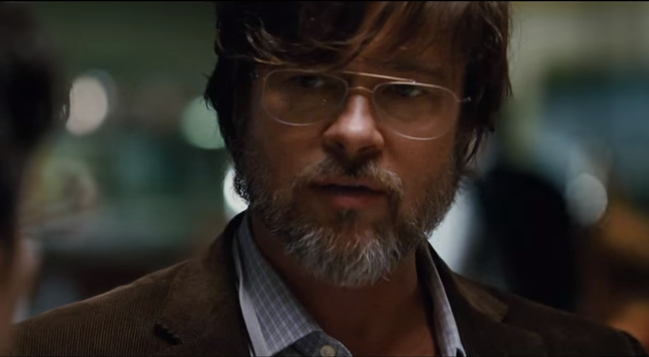'The Big Short' Review: Turning High Finance Into High Comedy

Brad Pitt in ‘The Big Short’
By Andrew Barker, Variety
Of all the current century’s most cataclysmic world-historical events, the 2008 financial crisis is probably among the most poorly understood. Filmmakers looking to rectify this have already approached the story from a number of angles, from sober-minded documentary (Inside Job) to operatic boiler-room drama (Margin Call), but the route taken by The Big Short is by far the most radical, turning a dense economics lecture into a hyper-caffeinated postmodern farce, a spinach smoothie skillfully disguised as junk food. Taking style cues from hip-hop videos, Funny or Die clips and The Office, Adam McKay’s film hits its share of sour notes; some important plot points are nearly impossible for laypeople to decipher even with cheeky, fourth-wall-obliterating tutorials, and the combination of eye-crossing subject matter and nontraditional structure makes it a risky bet at the box office. But there’s an unmistakable, scathing sense of outrage behind the whole endeavor, and it’s impossible not to admire McKay’s reckless willingness to do everything short of jumping through flaming hoops on a motorcycle while reading aloud from Keynes if that’s what it takes to get people to finally pay attention.
Related: Film Review: ‘By the Sea’
Adapted from Michael Lewis’ bestselling book The Big Short: Inside the Doomsday Machine, McKay’s film traces the roots of the global market collapse through the eyes of those who saw it coming and figured out ways to profit from it. First out of the gate is Michael Burry (Christian Bale), a stock-picking shaman with a glass eye and an utter lack of social graces, who crunches numbers while pacing his office barefoot and blaring Mastodon. By actually bothering to go through the thousands of individual mortgages that make up the securities that underwrite so much of the banking industry, Burry realizes that a dangerous number of subprime home loans are on the verge of going south, and decides to plug more than a billion dollars of his investors’ money into credit default swaps, effectively betting against the housing market.
His seemingly insane investments create enough of a stir on Wall Street to attract the attention of alpha-douche banker Jared Vennett (Ryan Gosling, who also serves as the film’s foul-mouthed narrator). Thanks to a fortuitous wrong number, Vennett winds up going into the credit-default-swap business with Mark Baum (Steve Carell, who like Gosling plays a fictionalized character), a self-hating hedge funder with a centimeter-long fuse. The potential windfall also interests the bumbling small-potatoes investment team of Charles Geller (John Magaro) and Jamie Shipley (Finn Wittrock), who loop in a former banker-gone-New Age (Brad Pitt) to help get them a spot at the grown-ups’ table.
Despite sturdy, energetic performances from all the actors mentioned above, only Carell’s Baum manages to register as a genuine, empathetic character; not coincidentally, he’s also the only one to express believable compunctions about getting rich off a looming fiscal catastrophe. Indeed, despite its satirical bent, The Big Short often seems a bit too eager to present these men as sympathetic, when all they really did was prove to be smarter than the average investor about a downturn that caused so much misery for so many innocent people.
Simply balancing this many characters (there are also significant roles for Marisa Tomei, Adepero Oduye, Hamish Linklater, Rafe Spall and Jeremy Strong) would be difficult enough, but McKay is also tasked with talking his audience through immensely — and at times intentionally — esoteric financial products and procedures. Sometimes he does this through onscreen text, and at others he’ll halt the narrative to have attractive celebrities spell out terms like “synthetic collateralized debt obligation.” Aware of how quickly viewers can tire of watching terrible men in suits screaming jargon at each other, the director also splices in lightning-fast montages of period appropriate pop culture and sometimes seemingly random imagery to keep up the pace. (Editor Hank Corwin more than earns his paycheck here with the sheer amount of visual information he’s managed to process, though the film could have done with a more low-key shooting approach than d.p. Barry Ackroyd’s somewhat exhausting camera movement.)
The Big Short is miles removed from McKay’s previous films like Anchorman and Talladega Nights, but a bit of their broadness remains, and his attempts at more subtle metaphorical commentary — an S&P analyst (Melissa Leo) with a vision condition, a drunken SEC agent (Karen Gillan) throwing herself at anyone with a Goldman Sachs business card — are way too on-the-nose. As it nears its final act, however, the film takes an effective turn for the serious, with even our cynical investor-heroes surprised to learn just how deep the institutional rot in the country’s financial systems really went.
And perhaps McKay’s hyperreal approach is exactly what this story needs, given how far removed from the reality-based community so many of the highest-paid financial gurus were at the time. (More than once, the film has to directly address the audience just to stress that, yes, the scene talking place actually did happen.) In the pic’s most viciously surreal sequence, Baum and company travel to Florida to see firsthand some of the mortgages that are threatening to go belly-up, finding cul-de-sacs full of abandoned houses, highly motivated McMansion sellers, and a pair of meatheaded mortgage consultants who chuckle over writing six-figure home loans for buyers with no income or down payment. Baum steps aside and consults with one of his agents. “Why are they confessing?” he asks, confused. “They’re not,” comes the reply. “They’re bragging.”
Watch the trailer:

